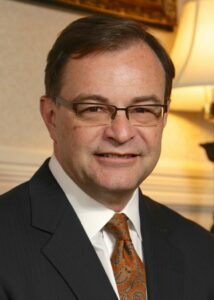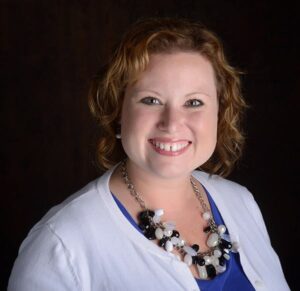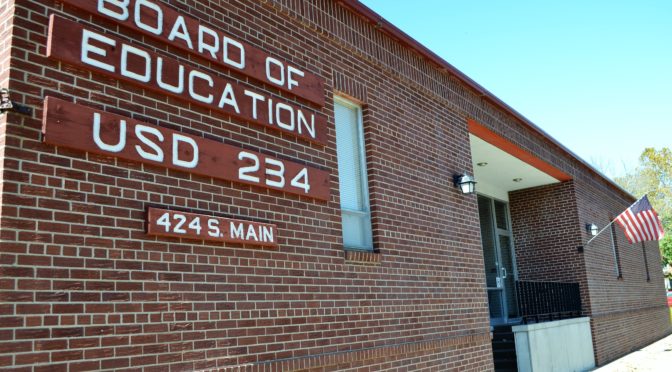
Dave Trabert, Chief Executive Officer of the Kansas Policy Institute, Overland Park, sent an email response to fortscott.biz‘s feature on the USD 234 Budget on Sept. 2.
“Under the new Truth in Taxation legislation, mill rates are reduced by law so that new valuations produce the same dollar amount of property tax…hence the name ‘revenue-neutral rate,'” Trabert said. “If the school district wants to take in more property tax dollars next year, they have to notify taxpayers of their intent, hold a public hearing, and then vote on the entire tax increase they impose.”
USD 234 Board Clerk/Business Manager and Certified Public Account Gina Shelton’s answers to Trabert are in blue ink.
“Correct – which we did,” Shelton said in a response to the Trabert email that fortscott.biz sent her. “What is missing from that statement is that we are to adopt a revenue-neutral rate based upon an estimated assessed valuation.”

“In general terms, it is a simple formula: Assessed Valuation (a) X Mill Rate (b) = Property Tax Assessed (c). If (a) and (b) stay the same, an entity would be revenue-neutral. If (a) increases and (b) stays the same = higher property tax assessed. If (a) increases and (b) decreases = lower property tax assessed/revenue neutral (depends on how much (b) is). “
“The school district only controls (b).”
” What the formula does not consider are things like 1) Collection Ratio 2) Neighborhood Revitalization (or other economic programs administered through other entities) and 3) the Assessed Valuation is an estimate.”
“This year, we received two separate revenue-neutral rates due to an error on the part of one of the utility companies. We also know that there is a larger taxpayer in our county that has applied for exemption, yet it was not backed off from the estimated assessed valuation. The exemption is retroactive to the date within the application. These are all factors that were considered when recommending being Revenue Neutral or not.”
“There is also a timing factor. We are very early on in a bond payback. Our bond is why the school district’s mill rate is as high as it is. We are committed to being good stewards of our taxpayers’ commitment.”
“When we reworked the bond in 2020, we were able to save our taxpayers $5,792,515.15 and will be able to pay it back five years earlier. However, we still have a way to go before that bond is paid off – September 1, 2035.”
“I don’t believe it is fiscally responsible to adjust the bond mill. The bond mill has to be considered because for the school district to qualify to be revenue neutral – we would have had to adjust our mill rates in all of the other funds (since the 20 mills in our General Fund is set by statute).”
” We know we have capital outlay needs for our district to maintain our facilities. Deferred maintenance costs more money. We did not feel it prudent to reduce the mill in the Capital Outlay fund.”
“In our LOB fund, we use a big part of this to pay for utilities. We were advised to budget 6% increases in electricity and 18% increases in gas. What would we cut to make up for those increases? What opportunities would we cut for our kids?”
“Gina Shelton’s claim that the LOB resolution has no impact on property tax is simply not true,” he said. The only way that could happen is if they adopted the revenue-neutral rate of 13.431. They choose to increase property tax… by 1.7% if they adopted the proposed mill levy. If the district adopted each of their proposed mill rates, they increased the burden on taxpayers by close to 2%.”
“In fact, it is claims like hers that drove taxpayers to demand the Truth in Taxation legislature,” Trabert said.
“I’ve never spoken to Mr. Trabert, to state that ‘claims like hers’ without having a single conversation with the person shows how very political this is.”
” I believe in transparency in government. I also firmly believe in being fiscally responsible. Our board has always been transparent about the challenges and positives of our school district to our community. Our board considered the pros and cons and made the decision based on the recommendation we made.”
Trabert included a chart:
http://www.kansasopengov.org/kog/databank#report_id=90&County=Bourbon
“We collected the information from each county clerk via Open Records requests,” he said.
“Any entity that does not follow the Truth in Taxation law is prohibited from spending above the revenue-neutral rate,” Trabert said.
“We are fully aware of this requirement,” Shelton said. Prior to the due dates set by the state, we discussed publicly what Revenue Neutral means for our taxpayers as our board meetings.”
“At the board’s July 12th board meeting there was a motion made to allow us to submit paperwork to the county to allow us the option to not be revenue neutral.”
“We declared to the county by the July 20th due date.”
“We held a detailed special budget/RNR presentation on July 30th, where we had one member of the public attend. This was an hour-long meeting meant to educate our community.”
“We then published in the Fort Scott Tribune newspaper on August 11th. After publishing, I only had one taxpayer come into ask questions and look at our budget.”
“I have always encouraged our taxpayers to please sit down with me to look at our budget to help explain what we do with those funds.”
“We then held a hearing on August 25th at 5:30. We received no comments or questions from the public at this hearing although the intention of that is to allow for that feedback.”
“We held our budget hearing on August 25th at 6:00. We also received no comments or questions during this hearing as well. Both were well attended.”
“Our community supports our kids. I’m sure Mr. Trabert has concerns regarding property tax – as we all do – however, he does not live, work, or send his kids to school here.”
“As someone who attended public schools in Fort Scott, lives here and has a student attending USD 234, my continued commitment has always been to be fiscally responsible of the dollars our taxpayers trust us with.”
“I believe our students are worth more than a political debate on property taxes. Mr. Trabert has not taken any time to call and discuss our particular district with us, but decides to contact the press? This leads me to believe that his concern is more with taxes in general versus our particular district or the challenges we face. Let’s work toward a workable, positive solution – our kids deserve that.”
“Kansas Policy Institute is a nonprofit research and education organization that protects constitutional rights and economic freedom,” Trabert said. “I am the CEO and work in our Overland Park office. Here is some background on our history and mission. https://kansaspolicy.org/about/”
“We were instrumental in getting the Truth in Taxation law passed.,” he said. “Senator Caryn Tyson, who represents most of Bourbon County, can also provide information on the legislation.”
“I have great respect for Senator Tyson. We have had several conversations where we discussed the challenges that face school districts. Challenges in addition to the fiscal side of schools. She knows how important our students are and how much our great state depends on their success. Public education provides opportunities that no other state program provides -both in the “right now” and for our future. The success and education of our students warrants our investment in them.”

School financing is very confusing. No matter how it’s explained we will still be taxed more. It still seems the only way to keep revenue neutral is to decrease the mill levy.
We need to ask for accountability in student outcomes. Are the students successful. Is our money being invested in the correct curriculum and is the curriculum being implemented effectively.